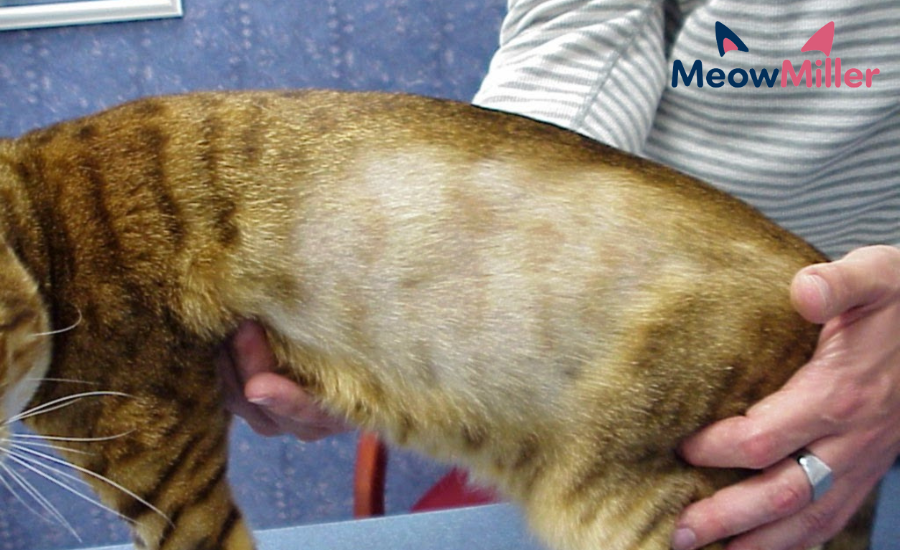Cats shed their fur naturally but only twice a year, in spring and fall. Apart from that, if you see excessive hair fall, then it’s alopecia, which can be concerning for pet owners.
I know, you know, everybody knows that when something like this happens with your kitty cat, you should visit the vet. Still, another side it’s obvious these days that people do Google first to know what could be the possible reasons behind losing hair. Is there something to worry about, or is it easily resolvable?
Searching on the internet will make the cat owner mentally prepared and I personally think it’s good to have the knowledge about the cat’s problems. Sometimes this can give extreme stress to pet owners because Google data is not always right but don’t worry we have written this article under the supervision of Dr. Kristen Nelson (My Cat’s Vet, which is for the last 5 years) and my experiences.
Going to the vet is the first and most necessary step but being a human we have a mischief-filled instigation to find remedies and try to fix them on our own.
Common Causes of Hair Loss in Cats
Allergies
Allergies can happen due to food, cosmetics, dust, mold etc.
If you ask me if there is any particular food that can cause an allergy, then I’m sorry, but your cat also doesn’t need to be allergic to the same food as mine.
Sometimes, cosmetic products cause fur patches because of some chemicals. Always use cruelty-free cosmetics. One of my friends used to kiss her cat on the forehead, and she noticed a spot where there was no hair. That time, she was using some lipgloss.
Parasite Infection
Fungus, ringworm and fleas are parasites, and they create itchiness in the body. The cat will scratch excessively, and it eventually ends up with bald patches.
Ringworms are highly contagious to other pets and humans.
Over-Grooming
Cats may over-groom themselves when they come under stress and stress triggers through a change in routine, new pets or sepration anxiety, etc. This condition is known as psychogenic alopecia.
Medical Issues
Hyperthyroidism and Cushing’s disease can lead to hair loss. Spayed or neutered cats sometimes experience hormone-related fur thinning.
How to Treat Cat Hair Loss
It’s a big myth among people that there is a vaccine that can control cat hair fall.
- Firstly, check if fleas or parasitic infections cause hair loss or patches, and then use veterinarian-recommended flea treatments.
- You can not delay the deworming of cats, do it on time.
- If you have a furry cat, comb it twice a day.
- Don’t give food that causes excessive hair fall in cats.
- Try to give your cat a stress-free environment.
- Add fish oil to your cat’s dry diet. It contains omega 3 and omega 6, which are good for the cat’s health and hair.
- Apply coconut oil to the bald areas. It works fantastic.
If your cat has areas of baldness, if it’s on his face between the ear and its eye, it’s probably expected, but anywhere else, I recommend you to take them to the vet for examination.
FAQs
Q1. Can hair loss in cats be seasonal?
Ans. Yes, cats do lose their hair seasonally during spring and fall. However, It is completely natural if you see hair loss patches that indicate some underlying problems.
Q2. Is cat hair loss contagious to humans?
Ans. Fungal infections like ringworm can be transferred from infected cats to humans. Always wash your hands after touching infected cats.
Q3. At what age do cats start losing their hair?
Ans. Cats generally lose their hair a few times in their life span when they are 2-3 months old or become older in age near around 10 years in age. And it also depends on the cat’s breed.
When an older cat sheds their fur, I worry about cancer.
Q4. Can stress really make my cat lose hair?
Ans. Yes, stress and anxiety make the cats scratch themselves and induce over-grooming. It is one of the common reasons why cats lose hair.
Q5. How can I prevent hair loss in my cat?
Ans. You can consider these points to prevent hair loss in cats:
- Always look for a balanced diet and avoid foods that can cause allergies.
- Do regularly check for flea or fungus.
- Regular grooming and keep your cat stress-free.
Conclusion
Hair loss in cats can occur for various reasons, such as allergies, stress, or underlying medical conditions. Observing your cat’s behaviour is really important, like their day-to-day lifestyle has any changes from scratching to eating, sleeping to playing. Consulting a vet is always the best option because they can diagnose the problem quickly and treat it ideally.
Moreover, this topic is for vets because every cat breed has different allergic points and it’s very difficult for me tell you the exact remedy for this. I have shared what I have gained in past 5 years.
I hope you have got what you were looking for. I’m interested in knowing how you deal with fur patches or hair fall in your cat. The comment section is open for you; drop your treatment style and describe how you discovered what is causing this problem.

